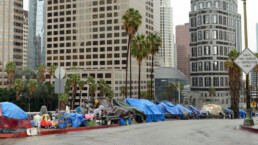A sweeping ballot initiative dubbed the “mansion tax” would raise funds to build supportive housing, provide rental assistance and implement other measures to help curb the crisis facing unhoused Los Angeles residents.
by Annie Howard, In These Times
After increasing nearly 25% between 2018 and 2020, the homeless population in the Los Angeles area has grown more slowly over the past two years. According to the latest count from the Los Angeles Homeless Services Authority, L.A. County’s unhoused population grew from 66,436 in 2020 to 69,144 in 2022, an increase of 4.1%. While there are numerous reasons for this downtrend, government intervention has played an important role. Such measures as Project Roomkey, which used federal, state and local funds to keep more than 10,000 residents in hotels and motels during the Covid-19 pandemic, showed that even modest public programs can make a significant impact on the city’s housing crisis, even as the initiative’s remaining residents lost their housing at the end of September.

But a slowdown in the overall growth of the city’s unhoused population betrays deeper reasons for concern. Particularly troubling is recent research by Home For Good – Los Angeles County, which found that older adults are the area’s fastest-growing homeless population, with 75% of seniors who live in rental units experiencing “rent burden” — spending 30 – 50% of their income toward rent. Senior homelessness is also a matter of racial inequality: while just 8% of LA County’s population is Black, 39% of seniors experiencing homelessness are Black, compared with 33% of the general homeless population.
For Laura Raymond, director of Alliance for Community Transit, a coalition of organizations fighting for equitable transit, housing, environmental justice and public health, this spike in senior housing instability is among her biggest concerns. It’s also one of the key reasons her organization has joined the fight for United to House LA, a campaign that’s been endorsed by housing advocates, homeless service providers and labor unions across the city. Measure ULA, as the initiative will appear before Los Angeles voters during November’s election, could raise nearly $1 billion in annual revenue to address L.A.’s housing crisis, with funds specifically geared toward older residents struggling just to stay sheltered.
Recent Posts
“Arrest Now, Ask Questions Later”: Why Did L.A. ICE Agents Arrest and Jail U.S. Citizen Andrea Velez?
July 3, 2025
Take Action Now “They didn’t have vests that said ICE or anything. Their cars didn’t have license plates. … Just because of the color of our…
Trump’s Big, Beautiful Bill Is Naked Class War
July 3, 2025
Take Action Now Trump’s “Big, Beautiful Bill” trades tax cuts on millionaires for the dissolution of society.By Hamilton Nolan, In These Times…
Mayor Mamdani’s First Day, A Zero Hour Conversation With Richard Wolff
July 2, 2025
Take Action Now If elected, what would Mayor Mamdani do on his first day in City Hall? How would a democratic socialist govern as a big-city mayor?……
The U.S. Is Funding A Bloodbath At Gaza Aid Centers
July 2, 2025
Take Action Now The admin just gave $30M to GHF, the organization at the center of charges that Israel is weaponizing assistance and shooting at…




